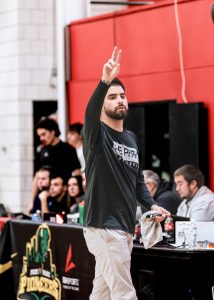Student filmmakers forced to get creative this semester amid pandemic
October 7, 2020
When cinema major Noah Kelley Lockette pictured long hours on set for his senior year at Point Park, masks, script rewrites and last-minute recasts were never part of the picture.
As an ambitious senior, Lockette admitted to piling on projects without knowing what he had signed up for.
“For the feature I’m filming, we recast the lead four times. One of them had COVID. Two of them were exposed to COVID. One was in a car accident,” Lockette said.
Although he weighed the option to take a gap year, Lockette expressed he was committed to come back to finish out his degree, even with COVID-19 precautions.
Usually productions are packed with students, Lockette said, but crews have had to cut down their numbers.
“I was working on this feature, and I was the first AC, keeping focus for the camera. I sat in a tent all by myself, just with a radio . . . I was still on set, but I was doing everything wirelessly by myself. It was weird,” Lockette said.
Lockette is one of the many seniors at Point Park who have had to rethink their final projects in order to meet the Point Park Cinema Arts COVID Safety Guidelines. The document lists the remarkable changes, which include shorter set hours, smaller crews,limitations on travel and prohibition of intimacy.
Terry Shirk, the department’s safety coordinator, plays a significant role in keeping students working on productions, but doing so safely.
“It really comes down to sanitization, PPE and social distancing. Those are the three big ideas on how to maintain a safe set,” Shirk said.
Students are required to take an online course before they are allowed to continue with their productions. They must achieve a high score on the quizzes before being approved to go to set.
“As a senior, to have to rewrite your script because of COVID is really frustrating . . . but we’re doing our best to try to make that happen to allow students to continue with their productions,” Shirk said.
Caleb Gretsky, a P4 senior-level director, said that he has been up for the challenge of creating during the pandemic, but has had to make changes to his script.
“In one of our scenes, [our character’s] mother kisses her on the forehead and her husband on the cheek. Now because of COVID, that can’t happen. Because it’s that face-to-face,” Gretsky said.
Musical theatre major Maya Santiago worked on set as an actor for a P4 production.
“We would sanitize between every take . . . we wore our masks the whole time, unless it was time to shoot,” she said. “There were tons of kisses that were taken out of the script.”
Cinema students have access to COVID kits, which include hand sanitizer, disinfecting wipes, gloves, masks and infrared thermometers. If a student shows a slight fever, they are required to leave set immediately, according to Shirk.
Student films are especially difficult since budgeting is so limited, said Gretsky, whose film is set in the 1940s.
“Trying to make a period piece in 2020 during a pandemic is a challenge . . . and finding caterers for individually packaged food for those on set is expensive,” he said.
Lockette expressed similar concerns, saying that “location scouting is difficult, especially with a low budget. People don’t want random young people spreading germs either.”
Lots of productions are moving slower than usual due to these restrictions. Equipment requests through Student Production Services (SPS) may take up to a week, instead of the standard 20-30 minutes it took in past semesters, Lockette said.
However, Lockette expressed that he thinks there will be a sense of mutual respect on future sets.
As for Gretsky, he said that “on sets, pre-COVID, there was no personal space. You are all close in tight spaces to film. Now there will be more personal space for everyone.”
Lockette said that one positive thing about coming back is “having an opportunity to work with other people who have had similar experiences during the quarantine and being able to make something collectively again.”


















